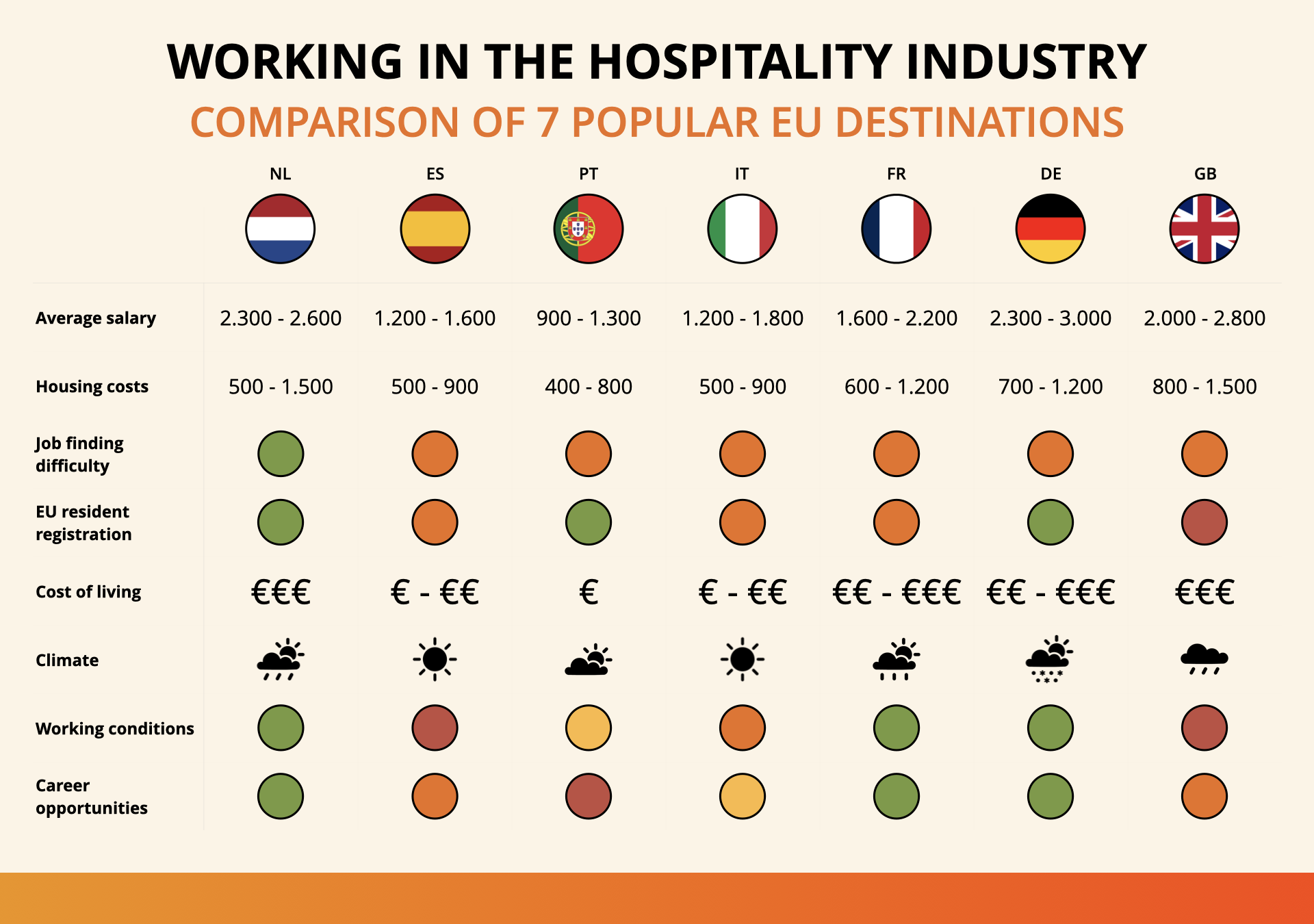Working in hospitality: How does the Netherlands compare?
Are you from Spain, Portugal, or Italy and dreaming of a job in the European hospitality sector? Then it’s definitely worth considering the Netherlands as your next destination. In this article, we compare key aspects, ranging from salary and living costs to climate and career opportunities, between the Netherlands and Southern European countries.
Comparison of salaries, costs, and other factors for working in hospitality across 7 European countries (including the Netherlands, Spain, Portugal, Italy, France, Germany, and the United Kingdom).
(text continues below the photo)

Salary and costs
Salaries in Dutch hospitality are among the highest in Europe. On average, hotel or restaurant staff earn around €2,300 to €2,600 per month. By comparison: in Spain the average is about €1,200–€1,600, in Italy €1,200–€1,800, and in Portugal only €900–€1,300 per month. In other words, with a job in the Netherlands you can earn almost double what is common in Southern Europe.
Of course, costs are somewhat higher in the Netherlands. Rent, for example, is significantly above Southern European levels: expect to pay between €500 and €1,500 per month, compared to €500–€900 in Spain or Italy (and even less in Portugal, around €400–€800). Everyday expenses such as groceries and public transport are also pricier in the Netherlands. In comparison tables, the Netherlands often scores “€€€” (high) for cost of living, while Portugal scores “€“ (low). Still, the higher salary more than makes up for it. Your income will cover these expenses, and you’ll often still have more left over than you would in Southern Europe. Plus, you get value for money: housing quality, infrastructure, and public services are generally excellent. Many expats feel the higher costs are justified by the higher standard of living, from reliable public transport to clean streets and good healthcare.
Finding work in hospitality
Worried about finding a job? In the Netherlands, you don’t need to. The hospitality job market is strong, with plenty of vacancies year-round. Employers in hotels, restaurants, and cafés, especially in cities like Amsterdam, Utrecht, and Rotterdam, are eager to hire staff. As an EU citizen, you don’t need a work permit, and many companies will help you get started quickly.
In practice, it’s easier to find work in the Netherlands than in Southern Europe. In Spain and Italy, competition for hospitality jobs is higher and many roles are seasonal, booming in the summer but drying up in winter. In contrast, the Netherlands has steady demand throughout the year. Many Dutch hotels even report staff shortages, meaning there’s no shortage of opportunities for enthusiastic workers.
Career opportunities and working conditions
Once employed, the Netherlands offers strong career prospects. Many Dutch hotels are part of international chains or follow a professional structure, giving you opportunities to grow, for example, from receptionist to supervisor and eventually into management. In Southern Europe, hospitality is often more traditional, with limited chances to move beyond seasonal roles.
Dutch employers are also known for good working conditions. You can expect an official contract, fair pay according to collective agreements, paid holidays, and extras such as holiday allowance (8% of your annual salary) and sometimes tips or bonuses. Working hours are respected, overtime is usually compensated, and training opportunities are common.
In Southern European tourist hotspots, by contrast, you often hear stories about long shifts in peak season or informal contracts. In the Netherlands, the work culture is more formal and reliable, offering security and a better work-life balance, so you can enjoy life outside of work too.
Registration as an EU resident
As an EU citizen, you don’t need a visa to come to the Netherlands. The only requirement is registering with the municipality to get a citizen service number (BSN). This process is usually quick: within a few days to weeks, you can have everything sorted, including a bank account and health insurance.
Delays can occur after the summer holidays when many international students arrive, but smaller towns often have faster availability. You can also check daily for cancellations. At the appointment itself, the BSN is usually issued immediately if your documents are correct. The main challenge is having a registered address. Sometimes your temporary housing doesn’t allow registration. Some employers help by offering a temporary company address. Employers may also allow you to start working once your BSN application is in progress. The number is valid for life, making the process relatively simple compared to Spain or Italy.
Weather in the Netherlands
Of course, the Dutch climate is different from what you may be used to in Southern Europe. Don’t expect endless sunny summers and mild winters like in Spain or Portugal. The climate is temperate maritime: mild summers, cool winters, and regular rain throughout the year. Yes, you’ll need your umbrella sometimes, and sunshine is less frequent. But many Southern Europeans find the Dutch climate refreshing: no extreme heatwaves in July and August, and occasionally you’ll enjoy a cozy autumn day or even a snowy winter morning.
Culturally, the Netherlands is open and international, especially in the bigger cities. Almost everyone speaks English, which is a huge advantage if you don’t yet speak Dutch. You’ll quickly feel at home, cities are full of expats and international students, making it easy to meet people from all over the world. Society is organized and tolerant: punctuality is important, cycling is a way of life, and direct communication is appreciated.
Overall, life in the Netherlands is comfortable and safe. And don’t forget the social side: Dutch people love activities, from celebrating King’s Day to enjoying drinks after work (vrijmibo). You won’t be bored in your new surroundings.
Conclusion: the Netherlands welcomes you
The Netherlands offers hospitality professionals everything they’re looking for: high salaries, good working conditions, plenty of job opportunities, and real career prospects. On top of that, you’ll enjoy a high standard of living in a well-organized country. The climate may be cooler, but the benefits, from financial security to job satisfaction, make it more than worthwhile.
Want to know everything about visas, BSN numbers, salaries, accommodation, insurance and working hours in the Dutch hotel industry? Visit our FAQ and quickly find the answers you are looking for.
